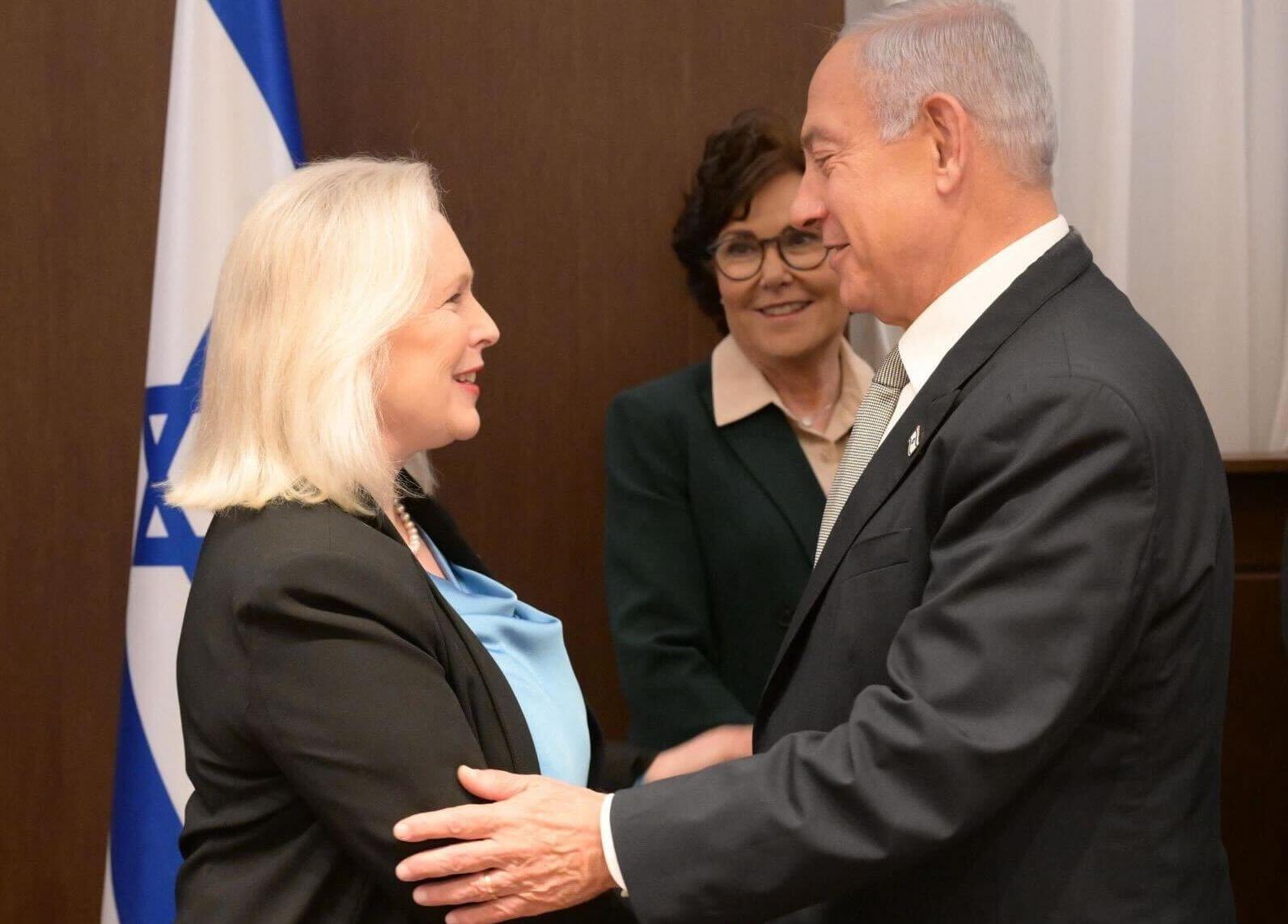Kirsten Gillibrand returns from Israel ‘optimistic’ about Netanyahu’s plan for Mideast peace
‘I think the Jewish community in New York expects that I’m a leader on issues related to Israel,’ the U.S. senator said in an interview

Graphic by Angelie Zaslavsky
A wave of criticism and protests from ordinary Israelis, Democratic politicians and American rabbis is crashing up against Prime Minister Benjamin Netanyahu just weeks after he returned to power. They object to his aggressive plan to weaken the judiciary. And the far-right extremists he has placed in senior cabinet positions have provoked criticism about prospects for peace in the Middle East.
At least one Democratic senator isn’t sounding the alarm.
“I have never come back from a trip where I felt this optimistic that there is a path to peace and regional stability,” U.S. Sen. Kristen Gillibrand, a New York Democrat, said in a phone interview following a recent trip to the region — her fourth visit to Israel. She also said leaders in Arab states that signed on to the Abraham Accords conveyed confidence in Netanyahu’s commitment to the agreement.
Gillibrand, 56, was part of a bipartisan seven-member delegation that visited Israel, the United Arab Emirates, Morocco and Bahrain last week to discuss ways to strengthen the Abraham Accords.
Among the photos the prime minister’s office distributed to the media after his meeting with the delegation in Jerusalem was one of Netanyahu embracing Gillibrand, one of four Democratic members of Congress on the trip. She described the meeting as “excellent” and said that Netanyahu laid out “a far-reaching agenda, much more so than I’ve seen in the last three meetings with him,” about expanding normalization with Arab countries.
And she took him at his word that regardless of the views of his coalition partners on the Israeli-Palestinian conflict, policy was driven by him. “I think it can be something that we just are mindful of and knowledgeable about, but I think the Abraham Accords is much bigger than any one coalition member,” Gillibrand said.
Netanyahu, thanks to the results of November’s close national elections, is serving his third stint and sixth term as prime minister.
A ‘strong agenda’ for peace
The junior senator from New York downplayed recent headlines made by U.S. Sen. Jacky Rosen, a Nevada Democrat and co-chair of the Senate Abraham Accords Caucus, about requesting not to meet with members of Itamar Ben-Gvir’s Otzma Yehudit or Bezalel Smotrich’s Religious Zionism parties due to their extremist views. “We never intended to meet with all the coalition members,” Gillibrand said. “It was always intended to meet with heads of state.”
The group also met with Israeli President Isaac Herzog, Knesset Speaker Amir Ohana and opposition leader Yair Lapid.
Gillibrand said she was equally impressed by the level of trust the heads of state in the Arab countries had in Israel to fight the nuclear threat posed by Iran and broaden regional cooperation. “They did not mention the new government as an impediment” to progress on that front, she said.
A member of the Armed Services and Intelligence committees, Gillibrand said a focus on the Abraham Accords could preserve bipartisan support for Israel in Congress, even among supporters of the two-state solution, many of whom worry it’s doomed with Netanyahu back in power. “I feel like we have a very strong agenda to come back to the U.S. and talk to President Biden about, and how he could create a very significant Middle East peace plan based on the Abraham Accords,” Gillibrand said.
The trip to Israel also carries some political advantages for Gillibrand. She is running for reelection in 2024 and New York State has the largest population of Jews outside of Israel.
“I think the Jewish community in New York expects that I’m a leader on issues related to Israel,” she said. “I think these types of trips not only inform my views, but they allow me to be a champion for the Jewish Americans in New York. It is part of my job and one that I take very seriously.”















